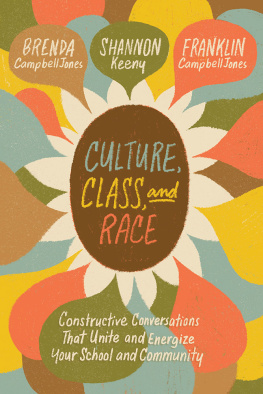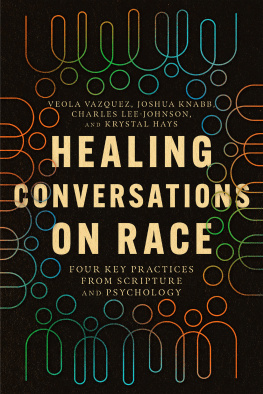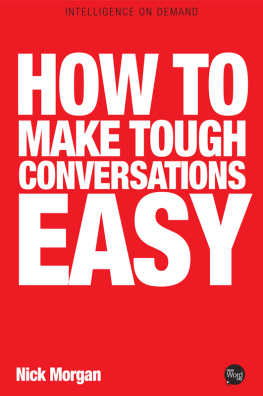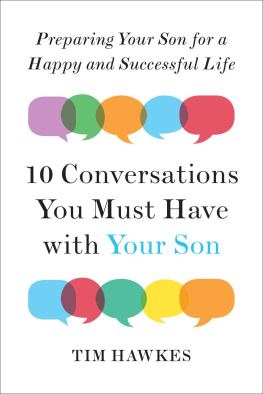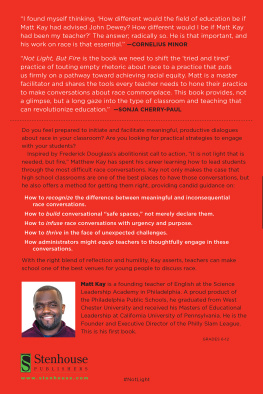Contents
Guide
Pages
Testimonial
....................
Brenda CampbellJones, Shannon Keeny, and Franklin CampbellJones have creatively expanded the expectations and conversation for establishing a more equitable society. It is a clear call to improve relationships in ways that are practical, engaging, and inspiring.
The authors take us beyond conversations on race, class, and culture to alignment with our inner core via asking and answering difficult questions. Finally, a conversation that can be held honestly.
Dr. Theresa Saunders
Associate Professor, Education Leadership and Counseling, Eastern Michigan University; Consultant, African American Student Initiative, Michigan Department of Education
* * *
This book is not just readit is "lived." The authors challenge and encourage each reader to be a mindful participant in a dynamic conversation of life. Individual voices carry the potential of the heart while our collective voices have unmatched power to liberate the dormant power of human potential.
Richard S. Martinez, EdD
Diversity Consultant, Leadership Coach, Founder of the Artful Alliance
* * *
Instead of pathologizing and exploiting differences, the authors offer core components of meaningful conversation about the real and often-divisive issues that emerge from the power dynamics implicit within diversity. They teach us how to engage with each other in a way that honors dignity, affirms personhood, and builds community.
John Krownapple
Diversity, Equity, and Inclusion Coordinator, Howard County, Maryland
* * *
As we have deeper conversations beyond race, class, and cultural boundaries, this book inspires readers to pose questions that "open up what is possible rather than shut down the emergence of newness."
I am inspired to reflect on why I teach, how I communicate and cocreate with all members of the learning community, and what I need to do to expand my capacity to communicate truthfully and freely on behalf of the students and families that I serve.
Alicia S. Monroe, EdD
Career Expert & Adjunct Professor, Rowan University; ASCD Faculty; CEO/Founder, Solutions for Sustained Success, LLC
Dedication
....................
To future generations of children yet to be born. It is my expectation that the conversations we have today will lead to a world of justice and celebration for who you are born to beexceptional human beings.
Brenda CampbellJones
* * *
To my parents and those who came before them. The love, encouragement, and guidance they showered upon me continue to drive me. To everyone who has been brave enough to share their story with me, I am forever changed because of you. I ask you to continue to tell your story and listen to others tell theirs.
Shannon Keeny
* * *
To our children, grandchildren, and great-grandchildren, who mirror all children in society. This book is intended to stimulate conversation with the potential of maintaining and advancing equity in schools, neighborhoods, and society.
Franklin CampbellJones
Foreword
....................
Our society, as well as esteemed members of our profession, have difficulty discussing issues of equity, let alone potentially more combustible topics such as "inequities." Drawing from their extensive research, academic training, and on-the-ground experiences in preK-12 schools, the authors seek to demystify and "demythify" these topics by offering field-tested approaches, strategies, and activities. Every educatorwhether a first-year teacher or an experienced teacher, counselor, or administratorcan gain valuable professional knowledge and insights that will ultimately benefit all students academically and socially.
This professional learning experience, shared in the pages of this book, seeks to break barriers of inequity. It is about providing students in our schools access to the ideals of a democratic society. The authors provide ways to assess
- Your comfort and skills in conversations that involve issues of equity.
- Your knowledge and understanding of issues related to educational inequities.
At the end of each chapter, the authors provide activities that are specifically designed to guide your personal learning and reflections and to serve as dialogic strategies that you can use in your professional learning communities.
One thing comes through clearly in this book: conversations do matter! The authors have captured the essence of why conversations matter when the topic is about -isms, including racism, sexism, classism, and ableism. These topics and other learned treatments of people as a result of systemic oppression are typically avoided or often result in anger, denial, stuckness, and even broken relationships. This well-curated text gives educators guidance for engaging in intentional and meaningful conversations about the best ways to relate to each other, including step-by-step practical plans and strategies for thinking together, even when their points of view and life experiences differ.
Early in the book you will find definitions of vocabulary terms often used in conversations about diversity but rarely understood through a common frame or common experiences. The definitions have emerged through understandings developed through dialogue, research, and shared experiences. Too often school leaders make decisions about access to resources, lack of resources, and abundances without shared understanding of important terms that are basic to education, such as inequity, disproportionality, disparity, and equality versus equity. Without such understanding, leaders often make decisions in isolation from the marginalized, disenfranchised, and silenced individuals for whom the decisions are being made. Shared visioning, decision making, resources, and opportunities rarely happen without first engaging in mindful and intentional dialogue that is needed to develop shared understanding of these terms and those who do and those who do not benefit from them. Using the guidance offered, facilitators and participants alike will learn the intricacies and highly prized skills involved in true dialogue.
It's All About Trust and Relationships
Margaret Wheatley, scientist and systems thinker, describes organizations by using the metaphor of living, breathing systems (Wheatley, 2009). Systems must be nurtured and energized for growth. They do not depend on hierarchy and organizational charts. They do depend on growth processes and energy exchanges and interactions. These interactions lead to connections and relationships. Wheatley says that for growth to occur, organizations must pay attention to
- Their vision and identity;
- The information that flows throughout the organization; and, most important,
- The relationships.
The authors emphasize the importance of relational trust among members of schools and organizations that serve diverse student populations and are confronting issues surrounding and including lack of access and inequity. After all, schools are composed of people learning and working together. Without trust, teachers are suspicious of decisions administrators make, parents are reluctant to believe what teachers and leaders say about how decisions and rules are made, and administrators might hesitate to implement board policies when the only response to the question "Why do we do it this way?" is "We've always done it this way." Without trust, the organization loses energy, lacks nurturing, and suffers from loss.

